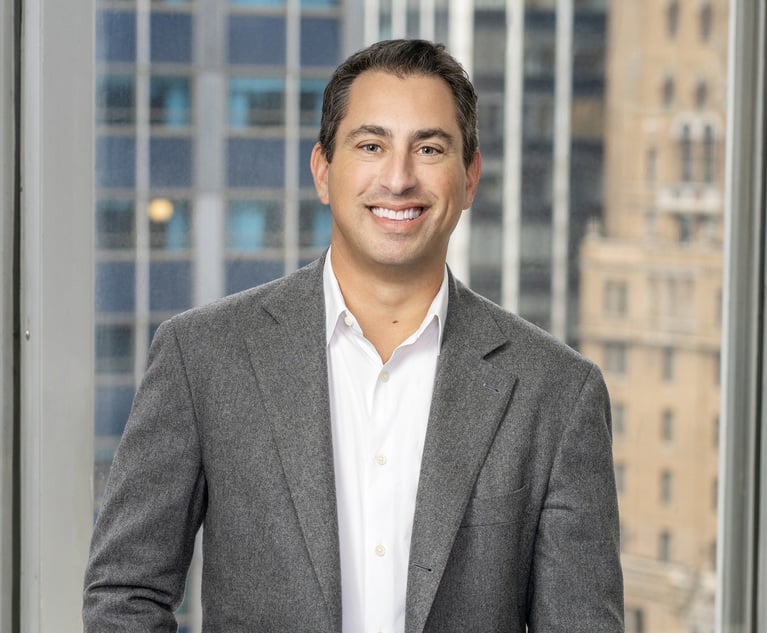 Alex Malyshev, partner at Carter Ledyard & Milburn. Courtesy photo
Alex Malyshev, partner at Carter Ledyard & Milburn. Courtesy photo Moving Beyond Growing Pains in New York's Cannabis Industry
As readers of this column know, New York's nascent adult-use cannabis market has (so far) failed to live up to the potential that was trumpeted when…
October 04, 2024 at 12:00 PM
5 minute read
As readers of this column know, New York's nascent adult-use cannabis market has (so far) failed to live up to the potential that was trumpeted when the Marihuana Regulation and Taxation Act (MRTA) was signed into law in 2021. Everyone, from consumers and industry participants, up to Gov. Kathy Hochul, has expressed their frustration in the last twelve months with the state of the industry. The main target of the ire was the Office of Cannabis Management (OCM), the industry's primary regulator, which was roasted in a report, commissioned by the governor's office, from the New York State Office of General Services (OGS). The aftermath of the report has been a "cleaning of the house" of sorts, with several high-profile departures. However, as recent news reports indicate, the New York City Sherriff's Office (which was charged with shutting down illicit operators in New York City) is also part of the problem, and is now the target of a Department of Investigation probe into missing cash.
To be clear, it appears to be the case that OCM proceeded with the best of intentions in promoting the social-equity goals of the MRTA. The problem, however, has been in how it proceeded to implement those goals. Specifically, it decided to bifurcate the launch of the adult-use program by creating the Conditional Adult-Use Retail Dispensary (CAURD) program—which it intended to use to give justice-involved individuals (e.g., entrepreneurs who were previously impacted by the war on drugs)—in apparent contravention of the express provisions of the MRTA. OCM also sought to delay the entry of New York's Registered Organizations (the medical cannabis industry incumbents) into the adult-use market. This was the opposite of the approach New Jersey took, where it allowed existing medical providers to open their stores first and use the revenue generated to support the adult-use industry.
NOT FOR REPRINT
© 2025 ALM Global, LLC, All Rights Reserved. Request academic re-use from www.copyright.com. All other uses, submit a request to [email protected]. For more information visit Asset & Logo Licensing.
You Might Like
View All
The Organic Blooms Injunction Is The Latest Blow to New York’s Troubled Conditional Adult-Use Retail Dispensary Program
6 minute read
Illicit Marijuana Business Operator Is Ordered to Pay New York $9.5M

Judge Fast-Tracks Hemp Operators' Lawsuit Against New York
Law Firms Mentioned
Trending Stories
- 1Silk Road Founder Ross Ulbricht Has New York Sentence Pardoned by Trump
- 2Settlement Allows Spouses of U.S. Citizens to Reopen Removal Proceedings
- 3CFPB Resolves Flurry of Enforcement Actions in Biden's Final Week
- 4Judge Orders SoCal Edison to Preserve Evidence Relating to Los Angeles Wildfires
- 5Legal Community Luminaries Honored at New York State Bar Association’s Annual Meeting
Who Got The Work
J. Brugh Lower of Gibbons has entered an appearance for industrial equipment supplier Devco Corporation in a pending trademark infringement lawsuit. The suit, accusing the defendant of selling knock-off Graco products, was filed Dec. 18 in New Jersey District Court by Rivkin Radler on behalf of Graco Inc. and Graco Minnesota. The case, assigned to U.S. District Judge Zahid N. Quraishi, is 3:24-cv-11294, Graco Inc. et al v. Devco Corporation.
Who Got The Work
Rebecca Maller-Stein and Kent A. Yalowitz of Arnold & Porter Kaye Scholer have entered their appearances for Hanaco Venture Capital and its executives, Lior Prosor and David Frankel, in a pending securities lawsuit. The action, filed on Dec. 24 in New York Southern District Court by Zell, Aron & Co. on behalf of Goldeneye Advisors, accuses the defendants of negligently and fraudulently managing the plaintiff's $1 million investment. The case, assigned to U.S. District Judge Vernon S. Broderick, is 1:24-cv-09918, Goldeneye Advisors, LLC v. Hanaco Venture Capital, Ltd. et al.
Who Got The Work
Attorneys from A&O Shearman has stepped in as defense counsel for Toronto-Dominion Bank and other defendants in a pending securities class action. The suit, filed Dec. 11 in New York Southern District Court by Bleichmar Fonti & Auld, accuses the defendants of concealing the bank's 'pervasive' deficiencies in regards to its compliance with the Bank Secrecy Act and the quality of its anti-money laundering controls. The case, assigned to U.S. District Judge Arun Subramanian, is 1:24-cv-09445, Gonzalez v. The Toronto-Dominion Bank et al.
Who Got The Work
Crown Castle International, a Pennsylvania company providing shared communications infrastructure, has turned to Luke D. Wolf of Gordon Rees Scully Mansukhani to fend off a pending breach-of-contract lawsuit. The court action, filed Nov. 25 in Michigan Eastern District Court by Hooper Hathaway PC on behalf of The Town Residences LLC, accuses Crown Castle of failing to transfer approximately $30,000 in utility payments from T-Mobile in breach of a roof-top lease and assignment agreement. The case, assigned to U.S. District Judge Susan K. Declercq, is 2:24-cv-13131, The Town Residences LLC v. T-Mobile US, Inc. et al.
Who Got The Work
Wilfred P. Coronato and Daniel M. Schwartz of McCarter & English have stepped in as defense counsel to Electrolux Home Products Inc. in a pending product liability lawsuit. The court action, filed Nov. 26 in New York Eastern District Court by Poulos Lopiccolo PC and Nagel Rice LLP on behalf of David Stern, alleges that the defendant's refrigerators’ drawers and shelving repeatedly break and fall apart within months after purchase. The case, assigned to U.S. District Judge Joan M. Azrack, is 2:24-cv-08204, Stern v. Electrolux Home Products, Inc.
Featured Firms
Law Offices of Gary Martin Hays & Associates, P.C.
(470) 294-1674
Law Offices of Mark E. Salomone
(857) 444-6468
Smith & Hassler
(713) 739-1250







